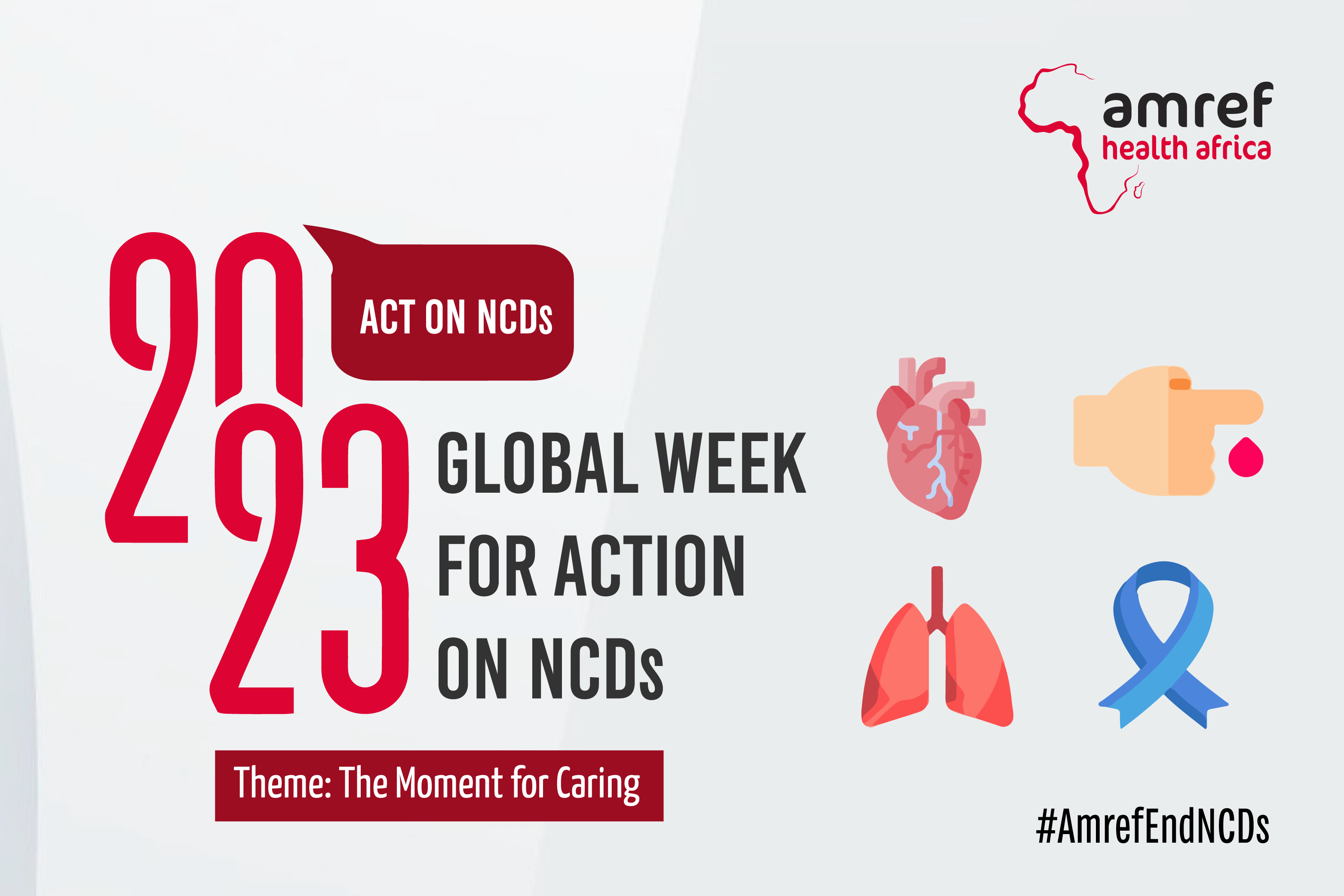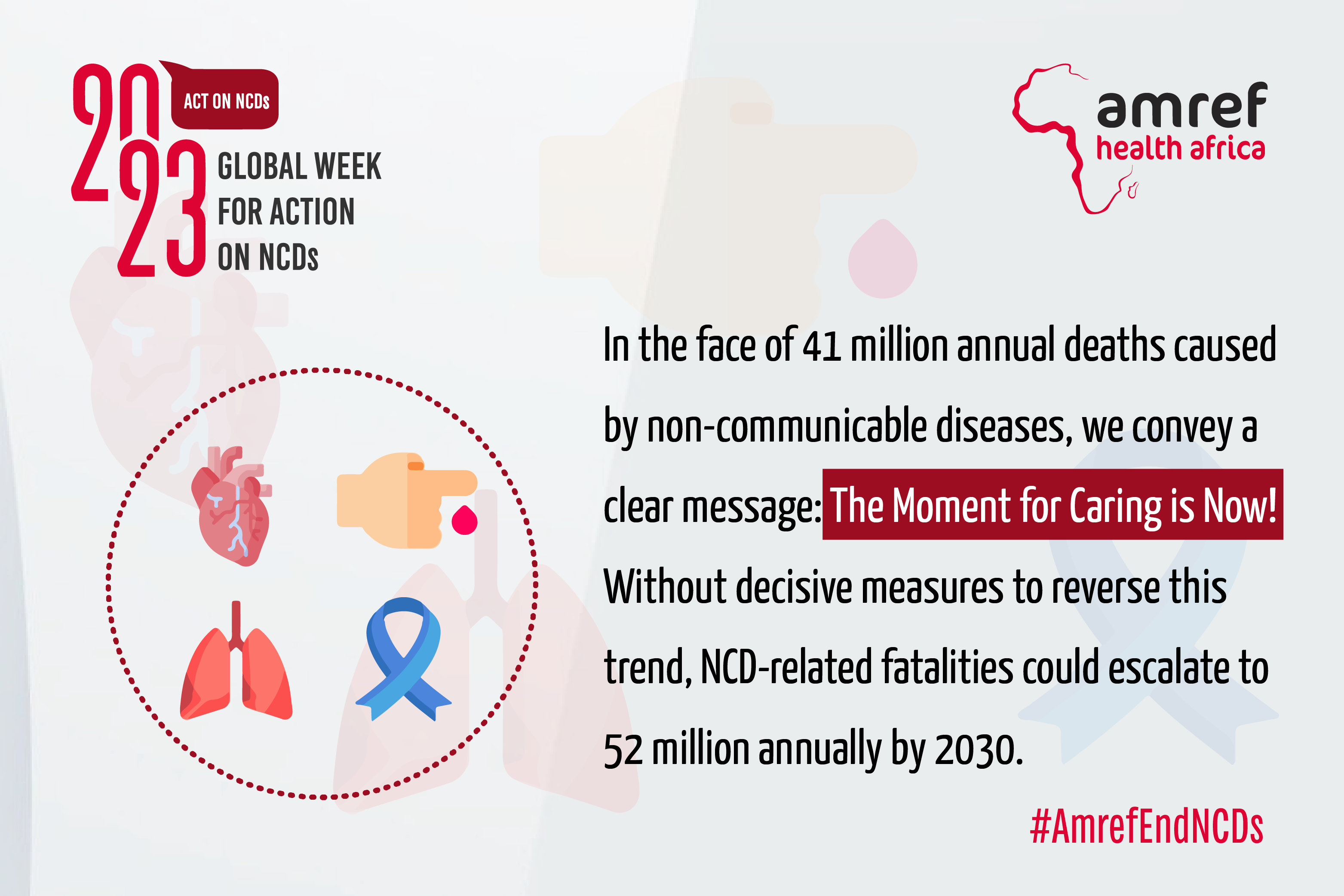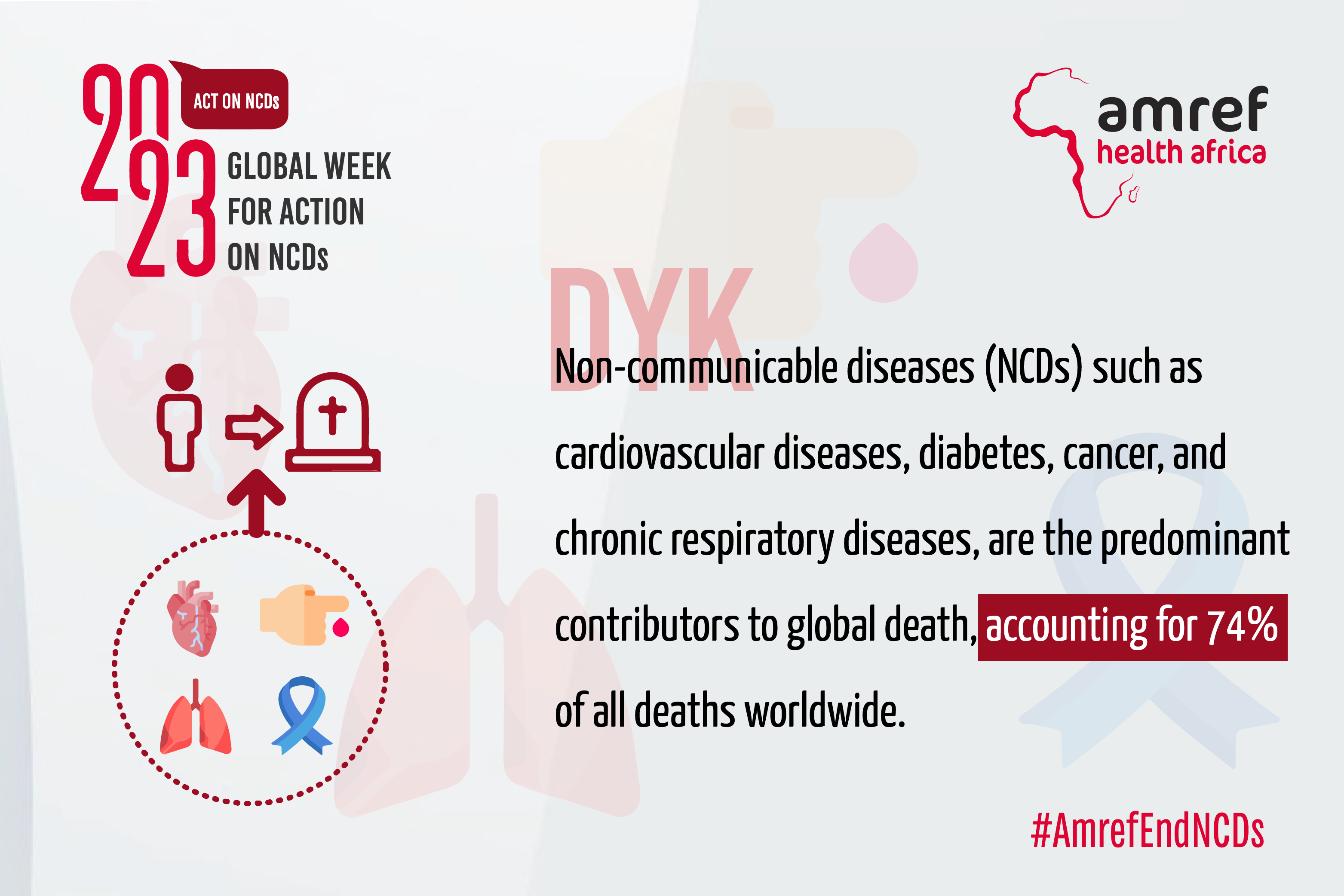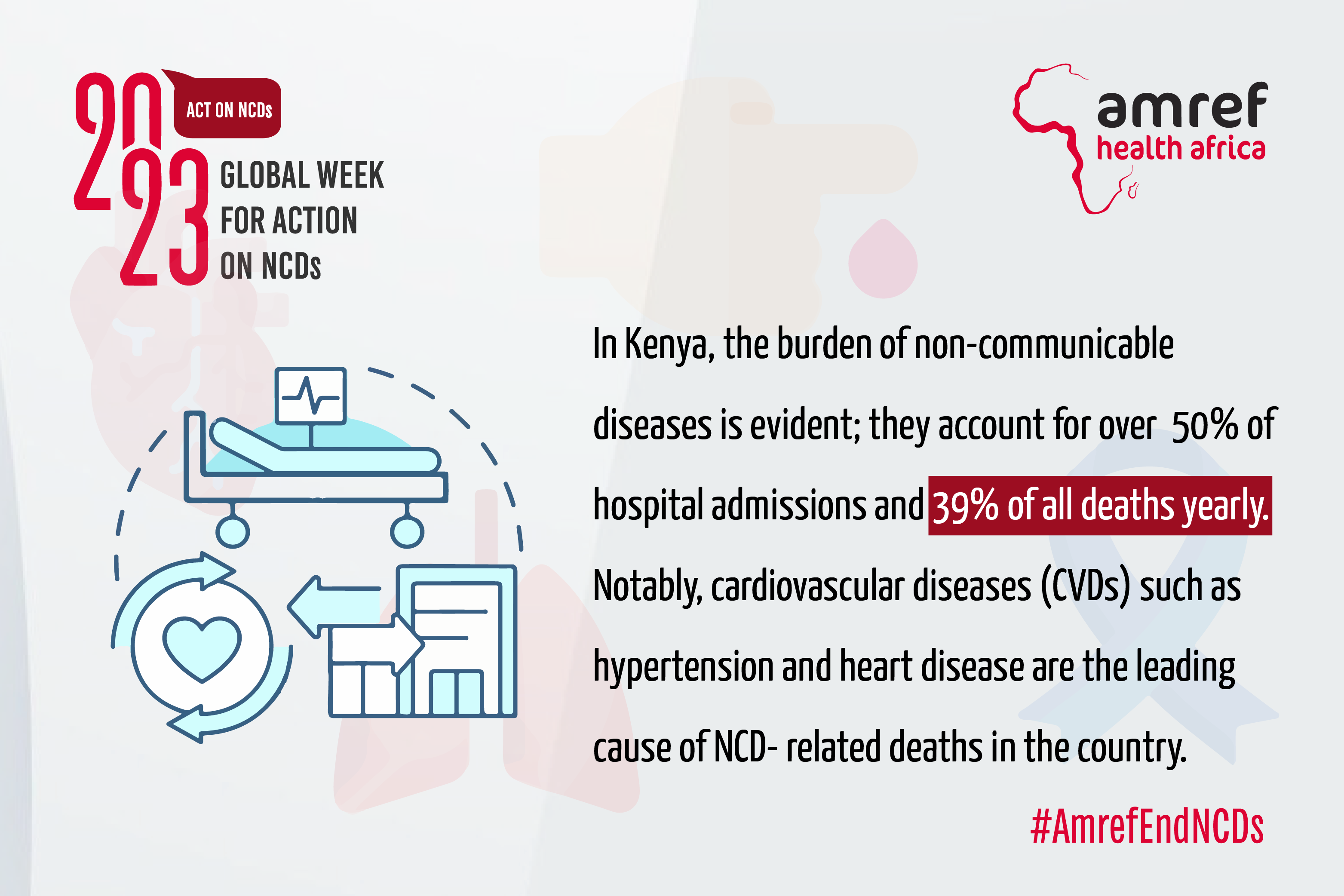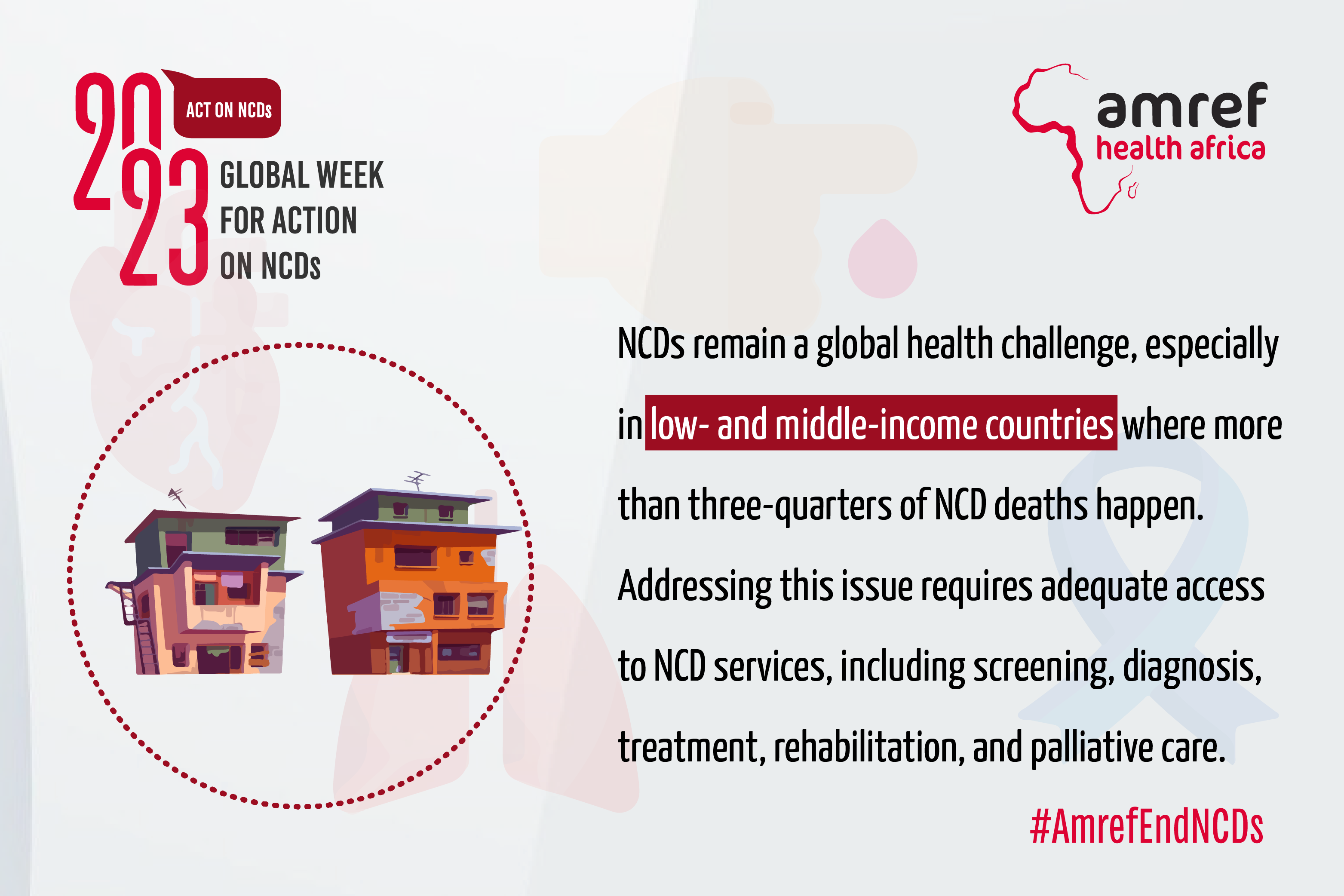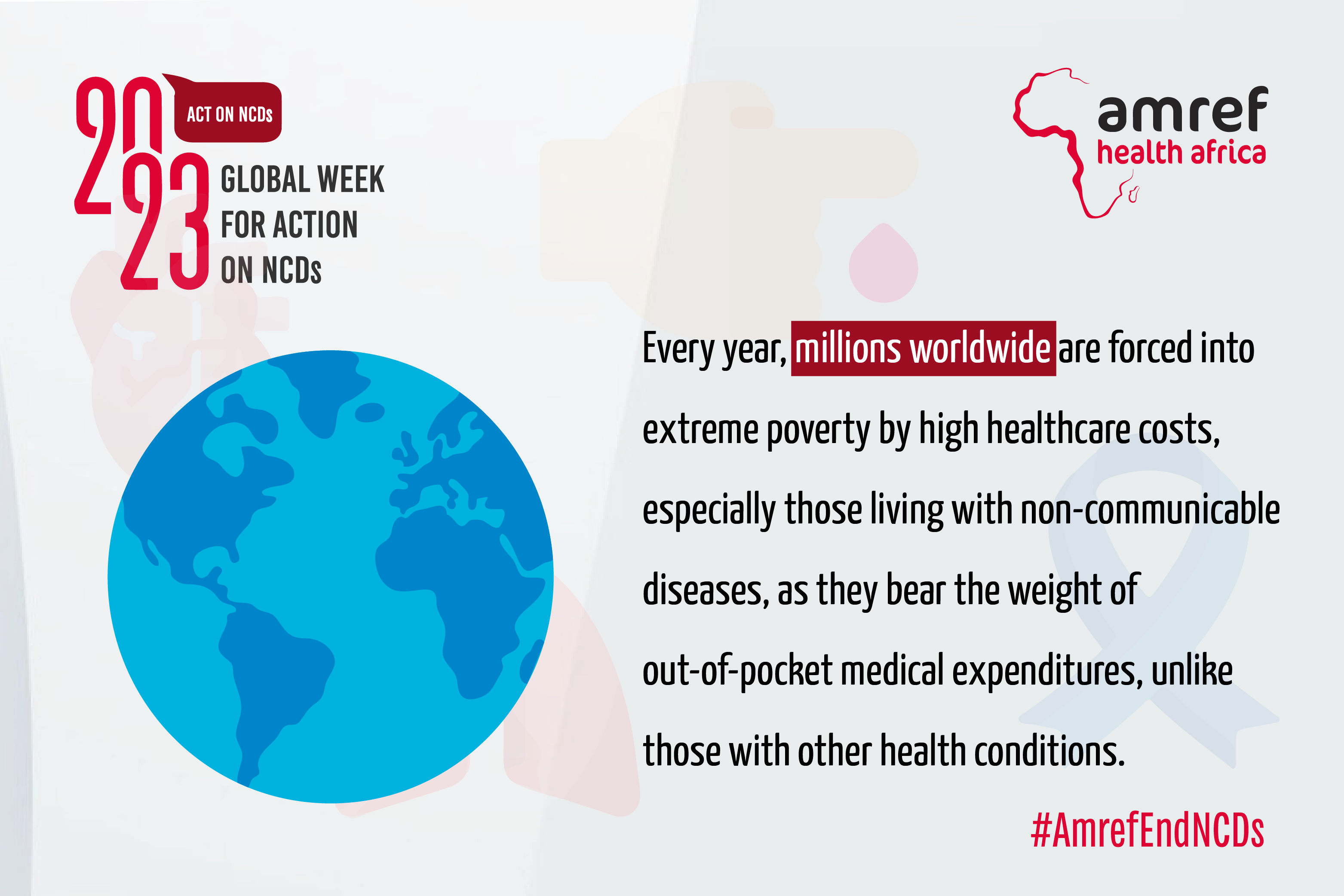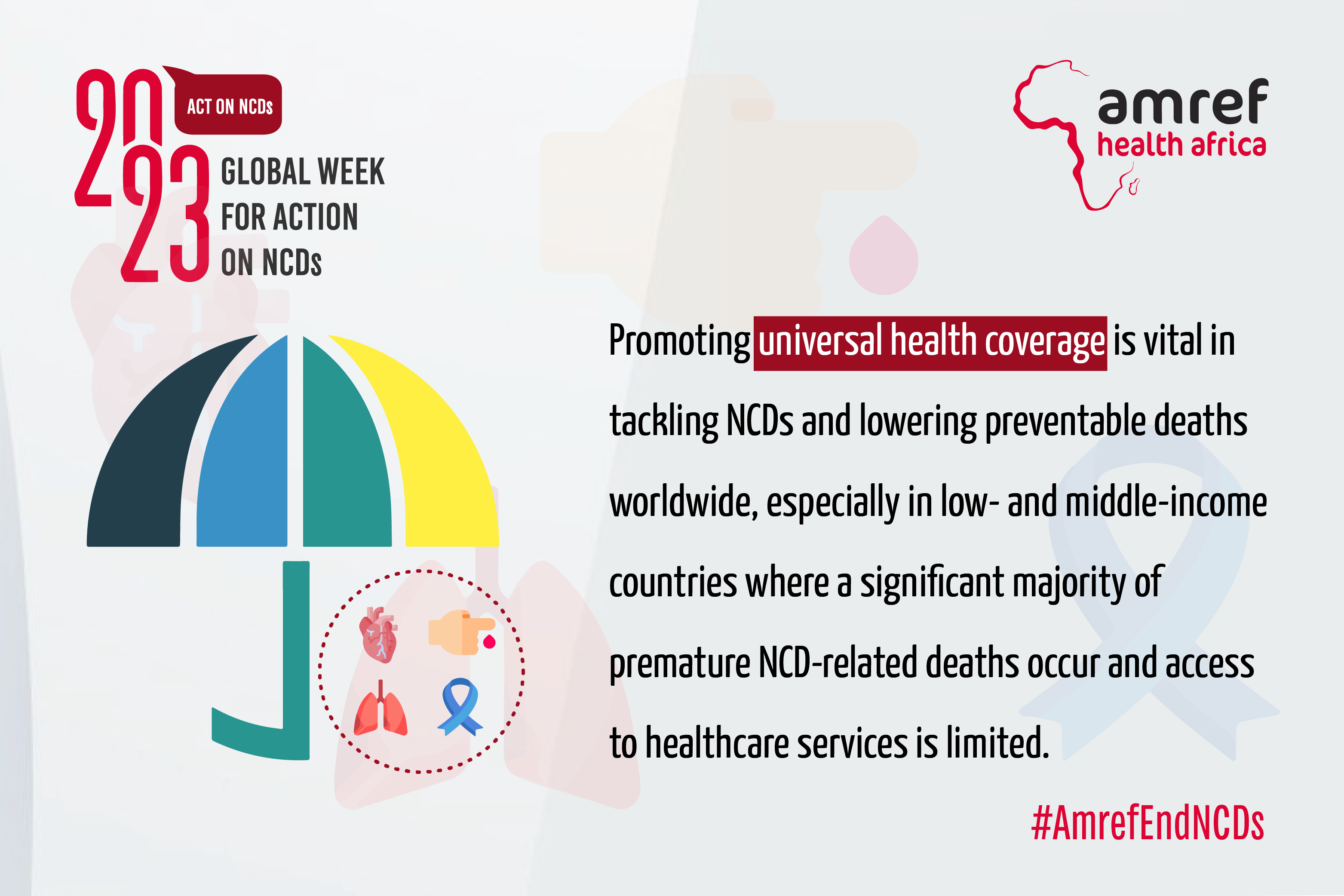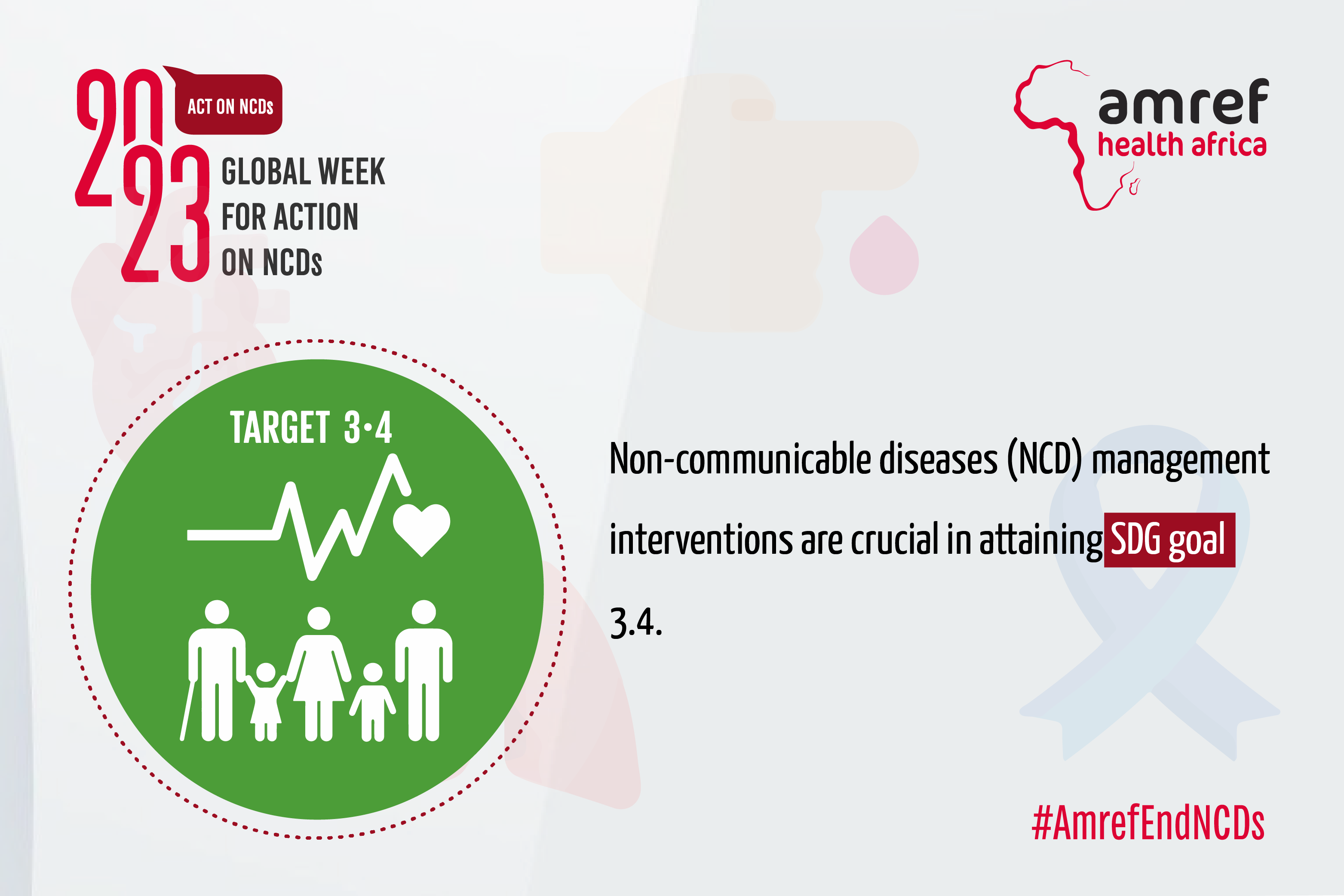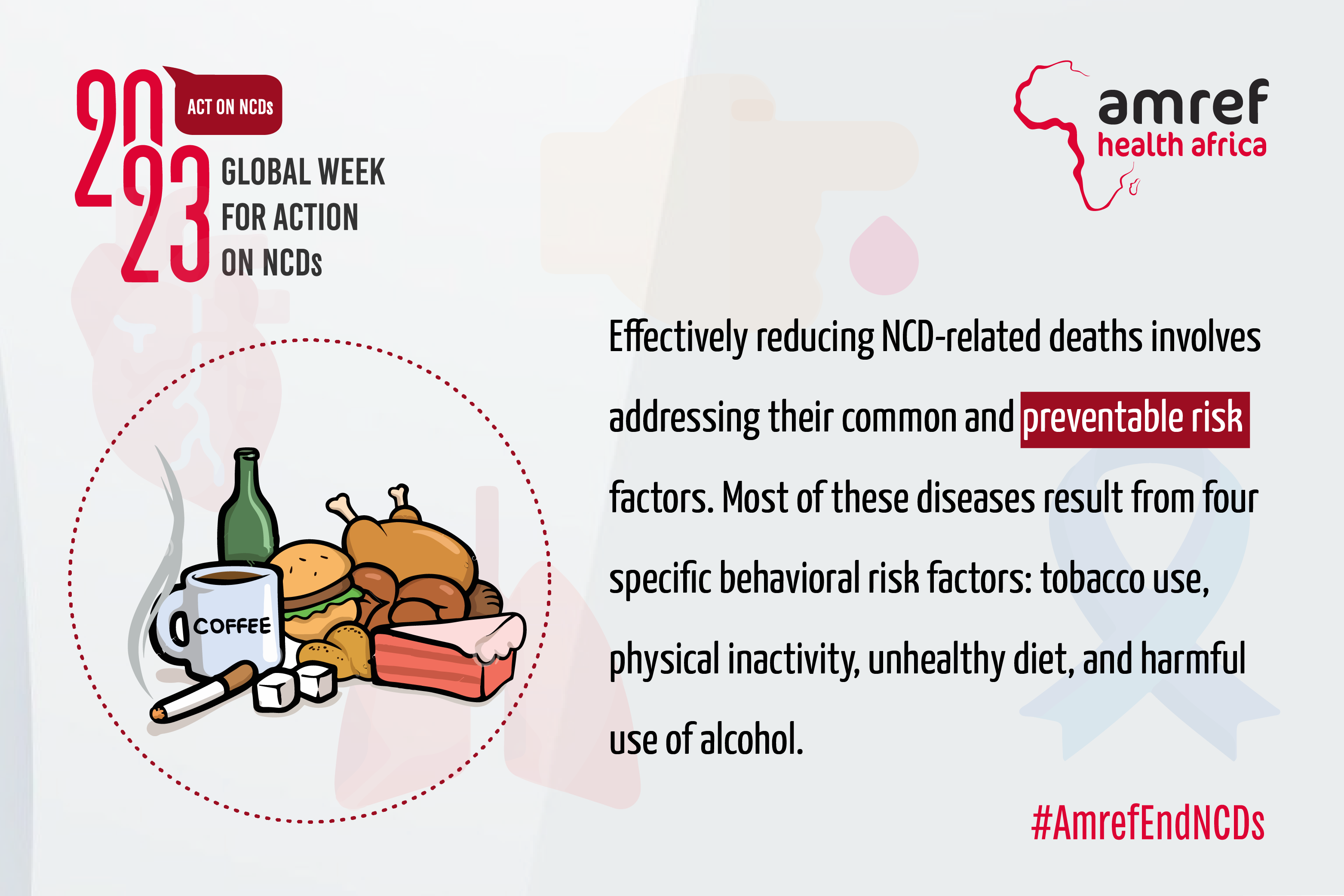Global Week for Action on NCDs
3rd – 9th September 2023
Theme: The Moment for Caring
Non-communicable diseases are a group of medical conditions that generally develop over an extended period and not caused by infectious agents or pathogens. Unlike communicable diseases, which are spread from one person to another or through other means of transmission, NCDs tend to result from a combination of genetics, lifestyle and slow progression – leading to significant health challenges, disabilities and even premature deaths if not properly managed. As we mark the global week for action on NCDs, we commit to raising awareness and educating the communities on the need to live healthy lifestyles – eating balanced diets, avoiding certain foods and drinks, engaging in regular physical exercise as well as extending a hand of care to individuals suffering from NCDs.
Share facts about #AmrefEndNCDs
These communication tools are available to share and print during the Global Week for Action on NCDs. Feel free to display and/or distribute on social media. On Twitter please tag @Amref_Worldwide when posting graphics from this social media toolkit.
Key Messages and Tweets
The annual Global Week for Action on Non-Communicable Diseases (NCDs) aims to elevate awareness of NCD prevention and control by ensuring these diseases receive the action and attention they rightfully deserve for the well-being of all people worldwide.
Due to their chronic nature, NCDs are causing most of the out-of-pocket spending by patients in Africa.
At Amref Health Africa, we are proud to join the Global Week for Action on Non-Communicable Diseases (NCDs) with a call to bridge the care gap through equitable and efficient solutions that promote access to quality care and treatment for all persons, families, and communities affected by NCDs.
In the face of 41 million annual deaths caused by non-communicable diseases, we convey a clear message: The Moment for Caring is Now! Without decisive measures to reverse this trend, NCD-related fatalities could escalate to 52 million annually by 2030.
DYK - Non-communicable diseases (NCDs) such as cardiovascular diseases, diabetes, cancer, and chronic respiratory diseases, are the predominant contributors to global death, accounting for 74% of all deaths worldwide.
We call on ministries of health across Africa to avail high-quality NCDs' healthcare service packages at primary and district health facilities to help patients to reduce their expenditures considerably on transportation, accommodation, and commuting expenses in cities close to the health facilities.
African countries must focus on integrating detection, diagnosis, treatment, and care of NCDs in primary healthcare facilities. Such efforts are showing great results in Malawi, Liberia and Rwanda, with a good number of patients accessing severe NCD treatment and the consequently improved outcomes for these patients.
While accessing healthcare facilities and services remains challenging in most African countries, the fight against NCDs will be derailed especially with the global shortage of healthcare workers expected to reach 18 million by 2030.
In Kenya, the burden of non-communicable diseases is evident; they account for over 50% of hospital admissions and 39% of all deaths yearly. Notably, cardiovascular diseases (CVDs) such as hypertension and heart disease are the leading cause of NCD- related deaths in the country.
NCDs remain a global health challenge, especially in low- and middle-income countries where more than three-quarters of NCD deaths happen. Addressing this issue requires adequate access to NCD services, including screening, diagnosis, treatment, rehabilitation, and palliative care.
Although non-communicable diseases are frequently linked to the older age groups, evidence indicates that 17 million NCD-related deaths occur before age 70 yearly. Out of these premature deaths, approximately 86% occur in low- and middle-income countries.
According to the WHO's Noncommunicable Diseases Progress Monitor 2022 Report, Kenya records a 21% probability of premature mortality from non-communicable diseases.
Every year, millions worldwide are forced into extreme poverty by high healthcare costs, especially those living with non-communicable diseases, as they bear the weight of out-of-pocket medical expenditures, unlike those with other health conditions.
It's crucial to recognize that non-communicable diseases not only affect an individual's health but also create substantial socioeconomic burdens, including high healthcare costs, reduced productivity, increasing inequalities, and a cycle of poverty, impacting both individuals and economies.
Promoting universal health coverage is vital in tackling NCDs and lowering preventable deaths worldwide, especially in low- and middle-income countries where a significant majority of premature NCD-related deaths occur and access to healthcare services is limited.
Non-communicable diseases (NCD) management interventions are crucial in attaining SDG goal 3.4.
Providing crucial NCD interventions through a primary healthcare approach enhances early detection and treatment, leading to economic benefits by reducing the need for expensive treatments through timely patient care.
We are committed to SDG Target 3.4, which aims to contribute to reducing by one-third premature mortality from non-communicable diseases by 2030 through prevention, treatment, and mental health and well-being promotion. #ActionOnNCDs
Effectively reducing NCD-related deaths involves addressing their common and preventable risk factors. Most of these diseases result from four specific behavioral risk factors: tobacco use, physical inactivity, unhealthy diet, and harmful use of alcohol.
These behaviors lead to four key metabolic/physiological changes: raised blood pressure, overweight/obesity, raised blood glucose, and raised cholesterol.
Multisectoral action is crucial for the prevention and sustainable control of non-communicable diseases; it is pivotal for implementing cost-effective preventative and curative interventions to reduce the burden of NCDs in Kenya.
Deaths from non-communicable diseases (NCDs) currently exceed all communicable disease deaths combined. NCDs claim 41 million lives annually, which corresponds to 7 out of 10 deaths globally.
The risk of NCD-related mortality rises due to tobacco use, physical inactivity, the harmful use of alcohol, and unhealthy diets.
The leading types of NCDs globally include cardiovascular diseases, cancers, chronic respiratory diseases, and diabetes. Low- and middle-income countries account for 77% of all NCD-related deaths.
Modifiable behaviors, including tobacco use, physical inactivity, unhealthy diet, and the harmful use of alcohol, all increase the risk of NCDs.
Tobacco usage results in over 8 million annual deaths (including second-hand smoke exposure effects
Over half of the 3 million deaths annually attributed to alcohol use arise from NCDs, including cancer.
Inadequate physical activity is associated with 830,000 annual deaths
Non-communicable forces are propelled by rapid unplanned urbanization, globalization of unhealthy lifestyles and population ageing.
1 in 4 deaths among adult women is caused by Non-Communicable Diseases (NCDs) such as heart disease, cancer, and diabetes. Tobacco, a major risk factor for NCDs, continues to be widely used in Africa.
To address the rising NCD burden, Amref employed three scalable strategies: advocacy to influence policy change, integrating NCDs into existing Primary Health Care services, and empowering people through wellness festivals to promote regular screenings, wellness information sharing, and household behavior change on modifiable risk factors.
1. In collaboration with the Ministry of Health Kenya, Amref developed and digitalized a cancer curriculum using the mobile learning platform Leap. This initiative trained over 1000 CHPs, enabling them to do home visits to create cancer awareness, conduct screenings, and facilitate patient referrals. This effort enhanced community knowledge of cancer and improved health-seeking behavior for cancer screening.

